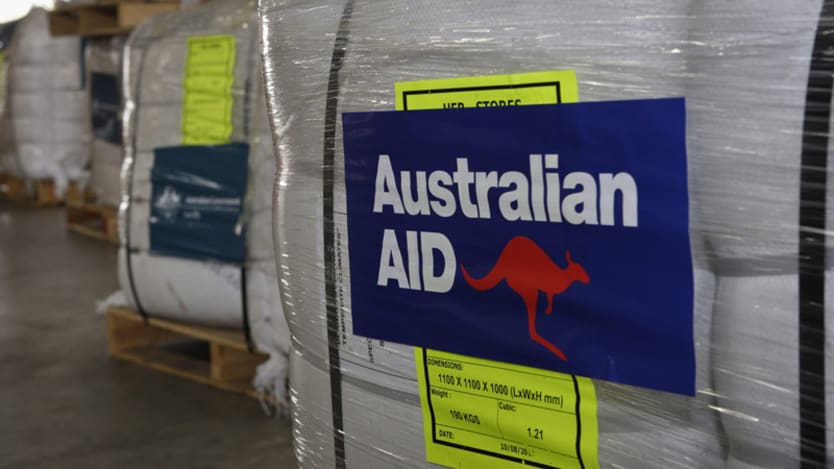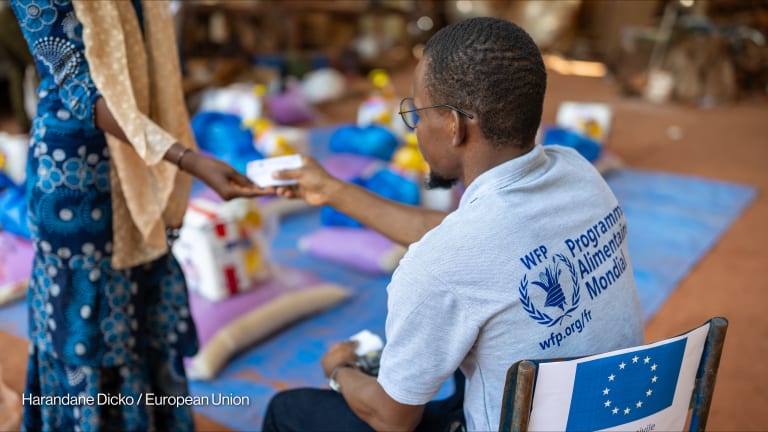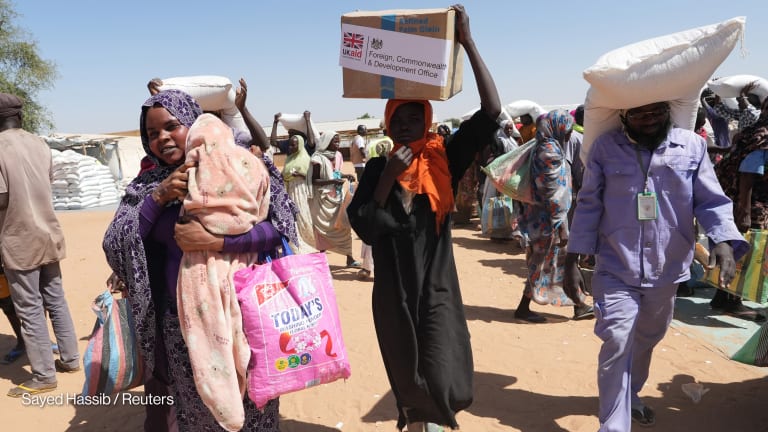
Ahead of Tuesday’s federal budget release, Australian media reported that an estimated 471 million Australian dollars ($348 million) is expected to be diverted from the aid program to the government’s police and security agencies for counterterrorism activities in Australia and on foreign soil.
See related stories:
► What NGOs want from Australia's foreign policy white paper
► DFAT's innovation resource facility: What it means for Australian aid
► Delivering an Australian aid program: How DFAT taps the private sector for public good
► New Australian aid announcements target famine and extremism
The news was initially reported in The Australian, with the full impact and final figure to be released on Tuesday as part of budget papers. The money will reportedly be moved from the Department of Foreign Affairs and Trade’s aid program to the Australian Federal Police, Australian Security Intelligence Organisation and Australian Security Intelligence Service.
Speaking to Sky News Australia on Monday, Liberal government member of parliament and former Human Rights Commissioner Tim Wilson justified the nearly half a billion Australian dollars in cuts as part of partnerships with foreign governments in securing Australia's borders.
More than two thirds of the diverted funds will be directed to activities directly on Australian soil, with Wilson justifying this as “a transfer of skills to other countries,” including Indonesia.
“This is not a diversion — this is a cut,” responded Tim Costello, chief advocate for World Vision Australia, in a statement.
NGO response
The news sparked outrage among NGOs, who were expecting an easy budget night.
“If the Government wants to fund counterterrorism, that’s their choice,” Tony Milne, director of the Campaign for Australian Aid, said in a statement. “But don’t cut funding to the world’s poorest from an aid budget that has already been cut to the bone by this Government.”
Helen Szoke, chief executive for Oxfam Australia, discovered the news after returning from a visit to South Sudan, where she was seeing the work her organization was doing to save the lives of those impacted by the growing famine crisis. The lives impacted by the new announcement were evident.
Amid funding shortfall, doubts over why UN links 4 food crises together
The United Nations has experienced a dangerously slow response to a $4.4 billion funding appeal to the food insecurity and famine crises that span Yemen, South Sudan, Somalia and Nigeria. Some development experts are now questioning the strategy of linking together four disparate emergencies.
“Right now, about 30 million people in four countries — South Sudan, Somalia, Nigeria and Yemen — are experiencing alarming hunger,” she said in a media statement. “Famine has been declared in South Sudan and is likely to already be happening in parts of northeast Nigeria, while Yemen and Somalia are on the brink. These cuts have affected long-term programs and have forced Oxfam to scale back its life-saving work in countries including Bangladesh, Sri Lanka and Zambia.”
Last year’s budget allocated a small amount of funding for sub-Saharan Africa, with funding for North Africa cut entirely. It is a region NGOs including Oxfam have deep concern for.
Speaking to media in front of Parliament House, chief executive officer of the Australian Council for International Development Marc Purcell said the news could negatively impact perceptions of aid programs recipients.
“Diverting the aid and development assistance to escalating a war on terror does not offer any response to humanitarian crises and the growing number of people who are struggling to meet basic human needs,” he said. “We are at risk of painting the most vulnerable people as security threats. Our assistance should be based on a common humanity, focused on helping to assist those most in need.”
On social media, the backlash was swift.
“We are at risk of painting the most vulnerable people as security threats. Our assistance should be based on a common humanity.”
— Marc Purcell, CEO of the Australian Council for International Development“The best way to stop extremism is giving all people more access to education, health and economic inclusion. That's what #AustralianAid does,” Brad Chilcott, board member for Results Australia, said on Twitter.
The impact on the development sector
Mat Tinkler, director of policy and public affairs with Save the Children, spoke to Devex about the cuts, saying assurances from the Department of Foreign Affairs and Trade had amounted to nothing.
“Our understanding of the new definitions contemplated were that it would be something determined in-post and in-country after a careful contextual analysis of whether violent extremism could be addressed through development,” he said. “We’ve been arguing that this kind of expense could be part of a holistic aid program but certainly not the kind of expenditure we have seen leaked today.”
Click here to view the new Devex interactive visualization of the Australian aid budget for 2017-18.
Purcell explained to Devex that there was enough research to show the value of utilizing aid in countering violent extremism through programs including education, health and economic development. The news, therefore, was surprising. “We’re very shocked the aid budget is being cut for the fourth consecutive time,” he said. “We’ve dropped in the league table of aid donors to number 17, and to see yet another cut seems to be going in entirely the wrong direction — it seems a nod to darker forces in Australia, that is turning inwards.”
Tinkler believes that the impacts would be more prominent long-term than immediately. “We’re having to write off our future projections, and it will be hard to maintain a core presence in some countries and regions,” he said. “It’s a dent in the pipeline in terms of funding expectation for NGOs.”
Africa, the Middle East and Southeast Asia are regions Tinkler believes will suffer the greatest impact in aid cuts.
But the impact was also personal.
Tinkler described the mood amongst Save the Children as “despairing.” “This feels like a kick in the guts,” he said. “It feels like every budget time, aid is considered the easy win for the government to find savings.” But Purcell also describes the mood as one of anger. “People are really worried that Australia is taking a leaf out of Donald Trump’s book,” he said.
Will Australia’s decision influence donors globally?
“People are really worried that Australia is taking a leaf out of Donald Trump’s book.”
— Mat Tinkler, director of policy and public affairs with Save the ChildrenAustralia’s announcement leaves a larger shadow on development funding globally.
The concern now is whether international donors will look to Australia’s example as justification for following a similar model. The changing definition of official development assistance means all countries can similarly shift aid funding and justify greater activity on home soil as “aid spending.”
Nyol Gor came to Australia from South Sudan ten years ago as a refugee, and told Devex the news today was disheartening — especially when he thought about the support Australia could be providing to children living in famine conditions. But most concerning, he said, was the global cascading effect the decision could have.
“When it comes to the immediate needs of a human being, especially those under four years of age, countries should be giving as much as they can and then looking to develop counterterrorism policies,” Gor said. “I do not see this as a model other countries should follow and I urge them not to. It is not the humane way of looking after each other — looking after other human beings.”
For more information on the results of Australia’s 2017 federal budget on the aid program, engage with our new Tableau interactive.
Read more international development news online, and subscribe to The Development Newswire to receive the latest from the world’s leading donors and decision-makers — emailed to you free every business day.
Search for articles
Most Read
- 1
- 2
- 3
- 4
- 5








